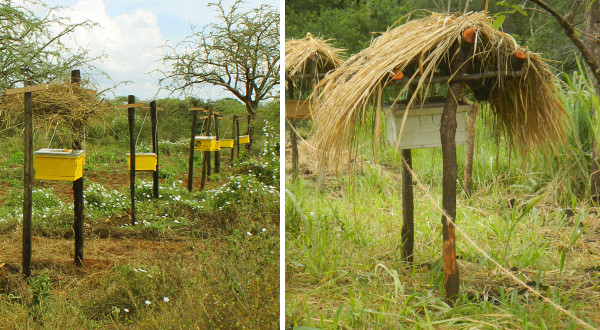Beekeepers, anyone? Could this ingenuity be adapted to fencelines here in say the pacific Northwest? I have horses that do not believe the confines of captivity apply to them. Article ;

← Northern WildSea Turtle Bag Ban →Elephants Bee-warePosted on June 18, 2009 by wildtracks Now here is a unique conservation idea – working with nature, instead of against it.
It seems that in spite of the fact they are the biggest animals on the continent, African elephants don’t like
bees. They go out of their way to avoid them.
Despite their thick hides, adult elephants can be stung around their eyes or up their trunks, while calves who have not developed this thick skin could potentially be killed by a swarm of stinging
bees.
Now some clever scientists from Oxford University have come up with a natural way to keep crop-raiding elephants away from human settlements. They made a
fence out of beehives.
Close up of the beehive
fence which can withstand crop raids by elephants. (Credit: Copyright Oxford University/Lucy King)
The fence is constructed of log beehives suspended on poles beneath tiny thatched roofs to keep off the sun. The hives are connected by eight metre lengths of fencing wire. Elephants avoid the hives and will attempt to push through the wire but this causes the hives to swing violently causing the elephants to fear an attack of angry bees.
Results of their pilot study in Kenya show that a farm protected by the beehive fence had 86% fewer crop raids by elephants, and 150% fewer raiding elephants than a control farm without the fence.
The reduction occurred even though none of the hives were occupied, indicating the elephants remember painful past encounters with African honeybees, and avoid any suggestion of them
The beehive fence survives elephant raids, and is cheap
enough for the farmers to construct themselves. The reaction from
local farmers has been very positive. An additional benefit to the beehive fence is that it affords protection from
cattle rustlers.
Once the hives are occupied by
native honeybees, the farmers will also get two or three honey harvests a year that they can
sell for additional income.
Small farmers in Africa can suffer devastating losses from crop raiding elephants. Animals who are identified as repeat offenders are often shot, so both sides lose.
Now with some clever thought from dedicated scientists, the famers, the elephants, and the honeybees will all benefit. No guns – no poison – no traps. Just a gentle nudge from nature.


















 I know that trip wires are used to keep deer from jumping fences, might be a bit dangerous with horses though. Maybe electric is the direction you need to go in.
I know that trip wires are used to keep deer from jumping fences, might be a bit dangerous with horses though. Maybe electric is the direction you need to go in. 




 ) . It seems a honeybee believes any dark, moving object is a raider! Those bees can get downright aggressive at moving the dog away from the area and Ellie, the dog, picks-up a hasty retreat.
) . It seems a honeybee believes any dark, moving object is a raider! Those bees can get downright aggressive at moving the dog away from the area and Ellie, the dog, picks-up a hasty retreat. 







 2
2




 2
2








